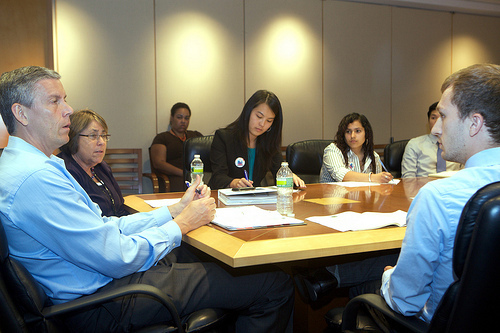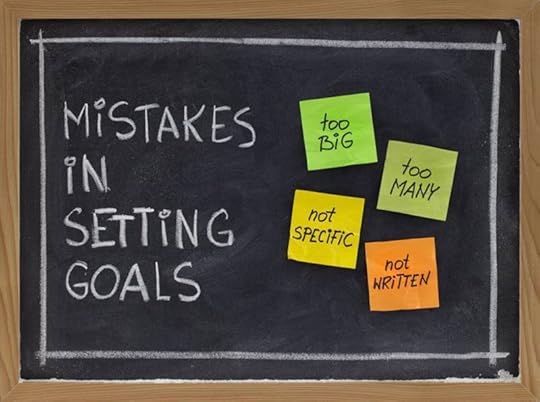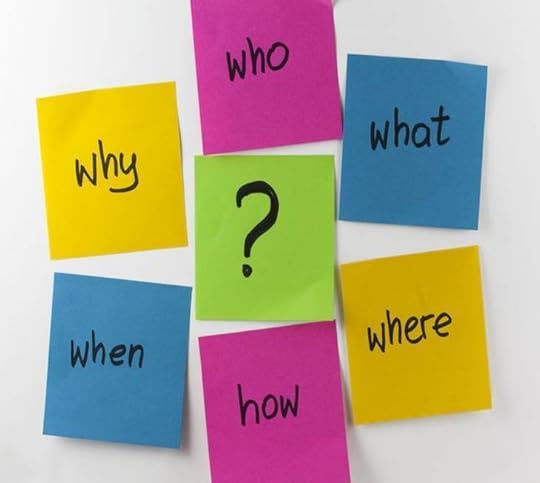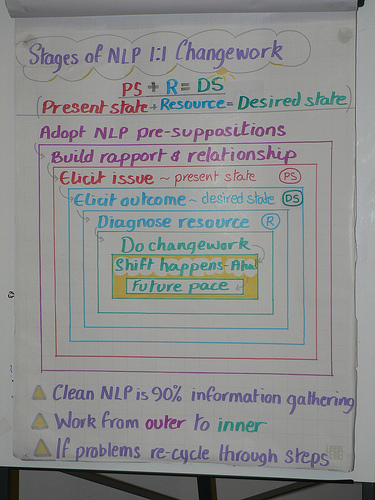Hiten Vyas's Blog, page 9
January 16, 2013
Discussions on resourcefulness at Everyday Gyaan

Corinne Rodrigues, a good friend of mine, is a writer and a motivational speaker. She also runs the quite brilliant blog called Everyday Gyaan.
I have written a guest post entitled ’5 Ways To Stay Resourceful’ at her blog. You can read the post here.
Photo Credit: US Department of Education
January 14, 2013
Obstacles to change and what to do about them

When we work on ourselves, there are usually stumbling blocks, which we encounter. The purpose of this post is to highlight some of these barriers and offer tips on overcoming them.
Too much, too soon
We’re into the New Year and you’ve probably got a number of goals for this year. You’re probably already making progress with these. If you’ve created goals properly then you’ve already taken appropriate steps.
However, if you’ve set yourself too many goals then you might have become overwhelmed. If this is the case, then stay calm and re-review what you’re doing at the moment. Chances are you might be trying to do too much, too soon. If this is the case then slow down your activities and make sure you’ve broken the activities down into small steps and just focus on achieving one step at a time.
Feeling you’re not worthy to change
If you have planned significant changes this year, where you will be making a big leap from your current position to where you want to be, then a barrier to your progress could me believing you’re not worthy of change.
It is best to ignore and completely re-frame such thoughts. All they are is old remnants of yourself, which are trying their best to hold you back and keep you where you are. It is best to observe such self-limiting thoughts and name and shame then as being false.
Feeling tired
Focused effort, which is done smartly always, pays off in the end. However, there is a risk of burning ourselves out in the process. Ensure you are taking regular breaks, resting your mind-body and doing things which you enjoy doing.
Take time out to do activities that will help you to rejuvenate yourself. This could be practicing yoga, talking a walk, having a regular workout, spending time with a friend or family members or reading a good book.
Feeling frustrated at the lack of progress
One of the greatest things I’ve learnt to do is try things out and learn from the experiences. If something doesn’t work out, then you can always have another go.
Indeed, life is short and this can be a powerful motivator to enable us to take action.
However, on a similar token it is useful to remind ourselves that even in this short life there is still time. Unless a person has reached a very senior stage of his/her life, there is still ample time to create change in your life.
Talk through your challenges
Sometimes a good chat with the right person can help us get unstuck. Talk through any stumbling block with an inspirational friend or family member. People who care for us and who know how to think outside the box can really help us. Selecting the right person for such a conversation is important.
Avoid discussing such issues with someone who cares but all they see is problems. There is nothing wrong with seeing problems, as long as the person can then help you to find solutions.
If you feel you need to, invest in the services of a coach who can work alongside you to help you achieve your goals.
Thinking too much
Usually when we create plans for new achievements, we think about what we want. We consider where we are currently and where we want to go. We think of what we need to do and become in order to achieve our goals. Thinking is a great ability we humans have.
However, at times what can end up creating problems is thinking too much. We get so bogged down with thinking, we end up creating anxiety for ourselves, about all that we have to do and in the process we become further overwhelmed.
Sometimes it is best to improvise and allow your intuition to take over and find answers to the problem you are trying to overcome. Doing so can seem risky at times. After all, by ceasing to think so much, people worry they will lose their identity. However, through improvising you will activate an innate wisdom, which is always there but gets hidden by all the thinking, most of which is unnecessary.
Worry about what others will think
Concern about what other people may think about your aspirations and activities is a sure fire way to prevent progress, especially if you let this affect you.
We all want to be accepted and appreciated. However, are you willing to do this by sacrificing what you really want in life?
If you’re not harming anyone through your activities, then you shouldn’t allow the potential disapproval of others to stop you. This is one example where the ‘life is too short’ principle really comes into play.
Do you really want to look back you on life when you’re elderly and regret doing one thing, which could have changed the direction of life completely for the better, because you were afraid of upsetting someone?
If you liked this post, then check out the latest posts from the blogs of the following awesome people:
My friend’s, it’s over to you:
How is your year going so far? Are you making progess with your plans?
Have you become a little stuck? If so, what are you doing to help yourself?
Please share your valuable thoughts in the comments box below, so that we can all learn from you.
Please also share this post on your favourite social networks.
Photo Credit: johntrainor
December 21, 2012
How to create compelling goals for 2013

Before you begin to make any positive changes in your life, setting goals will be essential for your success.
You may have created a goal at some point in the past. New Year’s is usually a time associated with goals. Most of us may be familiar with the term, New Year’s Resolutions.
Did you make a special resolution at the beginning of 2012? If so, what was it?
Maybe it was to exercise more.
Perhaps it was to get out of debt.
If you didn’t make a resolution, think of a time when you set yourself a goal.

Did you succeed in achieving your goal?
 If not, it might be worthwhile to consider why.
If not, it might be worthwhile to consider why.

There is a strong possibility that you weren’t specific enough. Goals rarely work effectively for this reason. They need to be detailed and focused.

Why make them specific, you might ask?
 Well, a goal such as “Wanting to lose weight”, is a little vague…
Well, a goal such as “Wanting to lose weight”, is a little vague…

Our brains need more details about what exactly our goal might be. So, if your goal is to lose weight, you need to be more specific, with precise details of when, where, and how do you want to lose weight.

Goals need to be stated positively. This way, you can focus on where you want to go, and not on what you are trying to get away from.

You should be in control of your goals, so that they are not dependent upon other people.
 Goals also need to be realistic, and broken down into baby steps that are achievable, and not over-whelming.
Goals also need to be realistic, and broken down into baby steps that are achievable, and not over-whelming.
 They also need to consider time. Say for instance your goal is to change your behaviour. Over which time frame will you work on changing your behaviour? How often do you want to display the behaviour?
They also need to consider time. Say for instance your goal is to change your behaviour. Over which time frame will you work on changing your behaviour? How often do you want to display the behaviour?

You need evidence that you have achieved the goal. How will you know that you have achieved the goal?

It is good to write down your goals. Writing down your goals helps you to remember them, and helps to reinforce you to take action.
Dale’s Example
Let’s explain each of the above steps, using Dale as an example.

Dale has a goal. He wants to be less anxious when giving presentations at university.
To make this goal easier to achieve, Dale will have to create specific and precise details about it. Doing so will help him to carry his goal out successfully.
Being more specific
Dale has taken his initial goal, and made it more focused.
He specifically wants to be less anxious when presenting in his law class debating group, at university. A goal stated this way, gives Dale something he can focus on, such as exactly where, and when he wants to be more confident. He has set a context and situation to achieve his set goal.
Stating the goal positively
Dale has also made his initial goal positive. Instead of wanting to be less anxious while presenting in his law class debating group meeting, he changes his goal to becoming more confident when presenting during his law class debating group meeting. This helps Dale focus on where he wants to go, and not what he is trying to get away from.
Under Dale’s control
Dale’s goal is also under his own control. He can work on becoming less anxious himself by improving his thinking. He doesn’t need other people to do this.
Making the goal realistic
He has also made his goal realistic. He states he will give himself 1 month to work on becoming more confident before his next law class debating group meeting. This does not put Dale under pressure, as it gives him sufficient time to achieve his goal.
Time dependent
Dale’s goal is also time dependent. He wants to achieve his goal once a month, to start off with.
Evidence
He states that he will know he has achieved his goal because he will feel confident and positive when presenting during during his law class debating group meeting. He will also be in an enthusiastic mood.
Written down goal
Dale writes down his goal, including the specific details that will help him to achieve them. He writes that he wants to speak confidently when presenting in his law class debating group meeting, once a month. He also writes how he will feel when he has achieved his goal, which is to feel confident and positive.
So there you have it. In summary, you have learnt about the key elements which are needed to make goals. Setting goals in this way will give you a better focus, and help you remain motivated, increasing your chances of achieving your goals in 2013!
My friends, it’s over to you:
What goals have you set for 2013?
How have you created your goals?
What would you like to achieve in the New Year?
Please share you valuable views and thoughts in the comments box.
Please also share this post on your favourite social networks.
I would like to wish you all a very Merry Christmas and a Happy New Year! I hope you make some amazing improvements in your life in 2013!
December 11, 2012
More Empowering Attitudes

This post is part two in the three part series on NLP Presuppositions. If you haven’t read part one, you can do so here.
So, let’s get straight onto some more powerful concepts, ideas and beliefs that can help you in your daily life:
7. We can model excellence, and even genius, if we break the tasks into small enough chunks. If someone can do something, then it’s a human possibility
This is one powerful belief.
Let’s consider it for a moment. By being able to model excellence, we can truly observe those people who have completed activities, tasks and achieved goals, which we may also want to accomplish.
We can break down into small bites what they do internally in terms of their thoughts and beliefs. We can model and replicate what they see, hear and feel in their thoughts.
We can model and repeat the self-talk they say to themselves and the beliefs they layer onto themselves.
Now by doing the above, doesn’t it just totally shatter into pieces the belief that we can’t do what we want to, because we’re not good enough?
I believe it does.
8. Mind-body are part of the same system and influence each other
Our minds-and-bodies are connected. There’s no other way about it.
You can experience this for yourself.
Just think of a happy experience you had previously. Really imagine it vividly. Do you now feel good inside your body? You’ve just witnessed how the mind impacts the body.
You can try this out the other way too.
If you go for a good workout at the gym, or even take a brisk walk, your mind will be clear and refreshed. In this case you used your body to impact you mind.
This mind-body connection is extremely powerful for making change in your lives.
Think and cultivate positive, happy, empowering and resourceful thoughts and your body will support you in your endeavours.
On a similar note, by taking care of your body through eating the right foods and getting plenty of sleep and exercise, means the mind will be in a good shape to continue developing and living wholesomely.
9. It’s always better to have choice, than the lack of choice
This is one attitude I have personally internalised. I’ve taught myself to look for choices by default.
How could this belief help you in your life?
Are you at the moment experiencing a lack of abundance in your life, because you’re not seeing the choices you have right in front of you?
If so, for whatever problem you are experiencing a lack of choice in, physically get a pen and piece of paper and write down ten ways that you can overcome the problem.
The choices are always there. Of course, they might not always be apparent. Doing something as simple as writing, can help us see the abundance which is there.
10. We add to choices in NLP, we don’t take choices away
How amazing is this one! What a powerful assumption to live by.
The whole NLP model, whether used for achieving excellence or for overcoming emotional problems is about increasing choices.
This is one of the reasons why NLP is such a helpful tool to life coaches, executive coaches and therapists.
11. Since memory and imagination use the same neurological circuits as external sensory awareness, they can powerfully influence our development
I really experienced this truth about this after I read Dr Maxwell Maltz’s amazing book Psycho-Cybernetics.
I was due to give a presentation at a leadership training course I was attending in my mid-twenties. I practiced and practiced giving a powerful and charismatic speech using my imagination. I vividly saw myself speaking confidently, with ease and authority. And then I stepped into myself, so that I was looking out of my own eyes giving this presentation with true grace.
And it worked. I scored a high mark and members of the audience told me afterwards how they really enjoyed it.
What this means is we don’t always have to have experienced behaving in a desired way in the ‘real world’ for it to become real.
Our mind-bodies will process what we have imagined and remembered like it is happening ‘for real’ anyway.
Therefore using your imagination and memory can be a very powerful way to enable personal transformation.
12. People are more than their actions, words, emotions, roles etc.
This belief allows us to see ourselves beyond what we do, say, feel and the roles we play in life.
It allows us to do the very same thing with other people.
By understanding this concept, we can forgive ourselves and others for mistakes. We free ourselves of limiting labels we might be calling ourselves, because we are more than this.
We are always more than our actions, words, emotions and roles.
For me personally, when I think of myself as a spiritual being, this is more powerful than what I will ever say or do. These other things become stuff of the ego, which for me can never be the real me.
Part two of this three part series on the NLP Presuppositions is complete. Stay tuned for the final one coming soon!
Over to you my friends
What did you think of the ideas, beliefs and concepts in this post?
How are you using any of them currently? How are they helping you in your life?
Can you see scope for adopting any with a current situation you find yourself in?
Please share you valuable views and thoughts in the comments box.
Please also share this post on your favourite social networks.
If you liked this post, please check out the latest posts from the following awesome bloggers:
Photo Credit: Melody Cambell
November 24, 2012
NLP Presuppositions Part 1

I first encountered the amazing field of NLP in my early twenties. I did a search for NLP and stuttering and came across Dr Bobby Bodenhamer, who would later become my NLP trainer.
NLP is set of tools people can use to model and replicate states of success. It can also be used to model unhelpful states and develop new and empowering ones as replacements.
Underlying the set of tools is a number of ‘statements’, beliefs or assumptions that are taken as granted. These are applicable to any person, no matter what their current circumstances are.
In the NLP world, these are known as the ‘NLP Presuppositions’.
They are very powerful and in this first of a three part series of posts, I will share some of these and explain what they mean, and how you can use them to live an empowered life.
1. There is no failure, only feedback
This is the most well-known presupposition and in my opinion the most powerful. This attitude supports any activity you do in your life. By adopting it and living it, you give yourself permission to try out things, experiment and most importantly get things wrong.
Because when you get things wrong, you’re not failing. It’s just feedback you can use to change and adapt the approach you are using, in order to continue improving and developing competence and excellence.
2. Our map is not the territory; it is but a map, a symbolic representation of the territory.
This is another very famous NLP presupposition.
This presupposition is all about ‘things not being like they always seem’. For example, let’s say you and four other people go to Canada on holiday. Canada in this case, is the ‘territory’. The place you all went to is the same.
However, the experiences you would all have would be different to each other, and each of you would recollect different memories about your trips.
What this demonstrates is our ‘maps’ are never complete. We can never know everything about something. Our ‘maps’ may contain distorted information and yet other information we have deleted. Hence, we can develop the ability to challenge our ‘maps’ and change them if they are not serving us to better ones.
It also allows us to be respectful of other people’s views of the world, to create strong rapport with others and helps us in developing relationships.
3. We respond according to our map of the territory, not the territory
Reality only exists in our own mind. We respond to this ‘reality’. This reality is created by the experiences we have through our senses (our eyes, ears, feelings, taste and smell) and the way we talk to ourselves. And we have these experiences through filters of existing thoughts and beliefs we already have.
Let’s take the movie The Godfather as an example. The Godfather represents ‘territory’. You watch this movie and create a ‘map’ about it. Your ‘map’ is that the film is brilliant. However your friend also watches it. The ‘map’ he makes about it is that it is boring.
So, the next time you talk about the movie with each other, you both respond according to your own view or ‘map’ about The Godfather. You tell your friend how amazing it is. And he tells you it puts him to sleep.
This realisation is a very important one. By responding according to our ‘own maps’ of the ‘territory’, we become responsible for them. We longer need to believe or feel anyone or anything external to us, is the cause of our problems. We’re not responding to ‘what is out there’. We’re responding to our ‘maps’ of what is out there and these can be changed. We have the capacity to do this.
4. The meaning of communication is the response I get
Ever had a conversation with a person and the other person just wasn’t getting you?
I know I have.
Isn’t it frustrating? You tell yourself “I’ve explained my point of view and she still doesn’t get it. What is wrong with this person?”
This attitude is reversed right around when you appreciate and adopt the presupposition that the meaning of communication is the response I get.
If another person doesn’t understand you, or you’re not getting the response you want, rather than blaming the other person, you just change the way you are communicating. This might involve using a different tonality, or certain words or a facial expression, or most importantly, really appreciating the other person’s view of the world before sharing you own.
You become responsible for the way you communicate.
5. The element in any system with the most flexibility will exercise the greatest influence
A way of looking at this presupposition is a group of people, which represents the system. The system is made up of a number of elements. One of these is you.
Let’s say your company is being bought out by a bigger company. The means line management structures will change, some people may have to change their roles in the company and others may lose their jobs.
Most of those whose roles will change demonstrate massive resistance. Your role is also going to change. However, rather than getting down about it and creating inner turmoil, you see the opportunity in the role, as you have the flexibility to adapt and change, as the company itself is changing. While others only experience resentment, you experience a sense of being able to progress in the company.
6. People are not broken; they work perfectly well
I love this one.
What it means is, you may be experiencing a certain problem in your personal or professional life. A loved one you know may also be experiencing a problematic issue.
However, there isn’t anything majorly wrong with you or your loved one. All you’re doing is running ‘unhelpful maps’ in your mind really well.
For instance, if you are a person who stutters and just the thought of giving a presentation makes you get anxious and fearful, then what this means is, you’ve just learnt to create anxiety in this particular context in an expert way!
And if you’ve learnt to create anxiety in the context of presentations really well, then you can learn to create another more resourceful response.
How you can use these NLP Presuppositions to help you
So they you have it. I have explained some of the key NLP presuppositions in this first in a three part series of blog posts on this area.
I hope you can see the true power in them.
In order to help you internalise them, contemplate on them and consider how you can apply them to aspects of your life. Repeat each of them to yourself 10 times a day. Use them as daily affirmations, until you really begin to see the truth in them and believe in them for yourselves.
NLP ebooks
If you would like to learn more about NLP, two of my ebooks, Presentation Confidence – Stand Up and Be Heard and Job Interview Confidence – Replacing Anxiety with Self-Belief are available from Amazon.com.
My friends, it’s over to you
What do you think of the NLP presuppositions?
Do you use any in your own life? How do they help?
Do you use any other empowering statements or assumptions to help you in life? If so, what are they?
Please share your views in the comments box below.
Please also share this post on your favourite social networks.
If you liked this post, then you might also want check out the most recent posts of the following top bloggers:
Photo Credit: Cantabrigensis
October 24, 2012
The boundaries of responsibility

One of the biggest causes of emotional heartache occurs when we confuse the boundaries of responsibility.
People are able beings. We are able to do things. Some of these are very personal things.
The 4 main abilities
What are your 4 main abilities?
1. Well you have the ability to speak.
2. You have the ability to think.
3. You have the ability to feel.
4. And you have the ability to behave.
Another way of looking at is, we ‘own’ our 4 abilities listed above. And by owning our abilities we also have responsibilities for the way we use our ability to speak, think, feel and behave.
Now when we use these 4 abilities, usually other people are involved.
We speak with other people.
Our thoughts can be about other people.
We can express our feelings to other people.
Our behaviours can affect other people.
Being a good and kind person means we have a responsibility to treat others well and not harm others.
What this means is that we are responsible to other people for the way we speak, think, emote and behave.
Notice I wrote responsible to others.
Other people have the same abilities
Just like you and I have the ability to think, emote, speak and behave; so does everyone else in this world.
And by having these abilities, they are also responsible to other people for how they use them.
What you are not
Wait for it, because it is now when I might say a few things, which might sound a little confusing. Before you continue reading, the following is based upon adults interacting with each other, and is based on the assumption that you haven’t intentionally hurt anyone, or done anything wrong.
You are not responsible for other people’s thoughts.
Neither are you responsible for their feelings.
You’re not responsible for the way they speak.
Neither are you responsible for how they behave.
Only they can ultimately be responsible for such things.
What happens when you believe you are responsible?
Let’s take an example.
Say you attend a family social gathering and a relative is in a foul mood and is acting unfriendly towards you. You then take this personally and believe it is you who caused this relative to act this way.
By doing this, you are taking on your relative’s thoughts. You are letting his foul mood cause you to feel bad about yourself and blame yourself.
Here’s another example.
You share your opinion on a topic with another person and the other person becomes very angry at your view and tells you how you’re wrong and how her way is right.
You then feel guilty and angry at yourself for upsetting this person.
By doing this you are taking someone else’s anger and applying it yourself. Even worse, you’re adding guilt to it.
Why is doing such things toxic?
Well, as I said earlier in the post, each of us is responsible for the way we talk, think, feel and behave (our 4 abilities).
If we believe we are responsible for other’s 4 abilities, then we give our personal powers away. We allow other people’s thoughts and feelings to take over us. Just as worse, we don’t allow others to have their own 4 abilities without us hijacking them.
What does this mean?
It means you are already empowered.
How can you demonstrate your empowerment?
By understanding people will always say, think, behave and express emotions towards us. However, how we choose to react is up to us. You can react, internalise what others have communicated to you and feel bad.
Alternatively, you can exercise your power of choice and choose to stay empowered and grounded, by allowing others to be them, have their views and opinions, without it affecting your state.
You do this by allowing them to express their 4 abilities and be responsible for them.
And you give yourself permission to use your 4 abilities too.
By doing this, you take control of your ability to think, behave, emote and speak.
Now, that is a powerful way to live your life, wouldn’t you agree?
My friends, it’s over to you:
In what ways have you taken on the responsibility for other people’s thoughts, feelings, actions and speaking?
What did you do to take back responsibility of your own 4 abilities?
Please share you thoughts and views in the comment box below.
Please share this post on your favourite social networks.
If you liked this post, you might like to check out the latest posts from the following great bloggers:
Photo Credit: Manitoba Historical Maps
October 5, 2012
Having coffee at Going A-Musing

I’ve written a guest post over at my good friend Vidya Sury’s blog Going A-Musing.
Vidya is a prolific blogger and writes about a variety of topics including happiness, life, relationships, inspiration, health and love. It’s hardly surprising she has a massive global following.
She is also a brilliant humour writer and many of her posts a littered with funny comments, which are usually about her direct life experiences and interactions with people. She also writes an excellent weekly post, which usually contains amazing pictures of life in India.
The post I have written at her blog is entitled Worried About Not Being Good Enough?
It will be great if you could join us, for a cup of ‘virtual coffee’ at Vidya’s blog. She’s a wonderful and very welcoming host.
Photo Credit: Dennis Wong
Hiten Vyas's Blog
- Hiten Vyas's profile
- 7 followers



